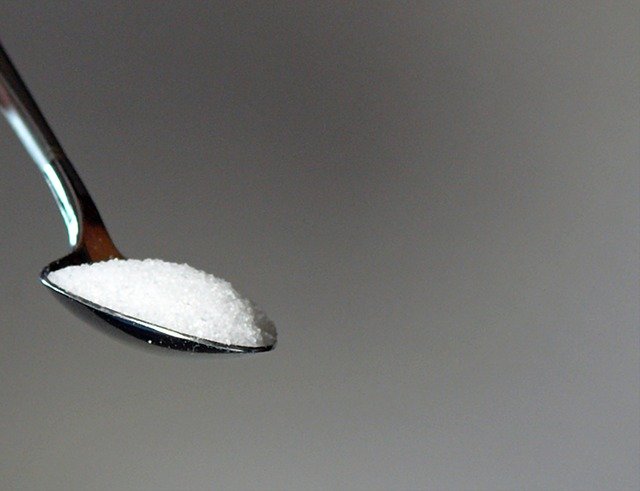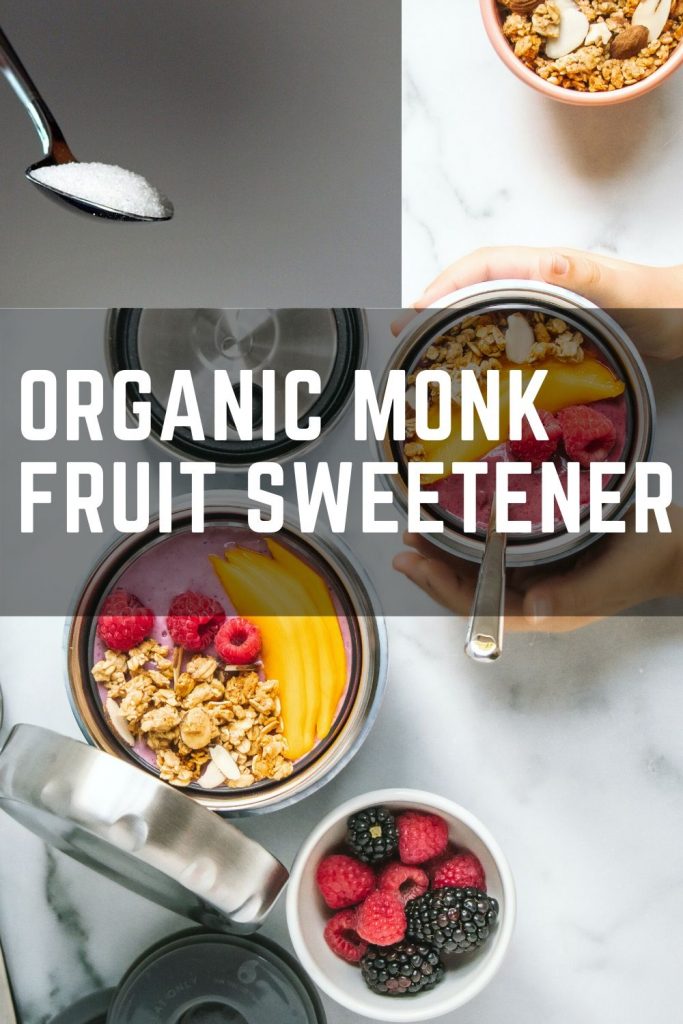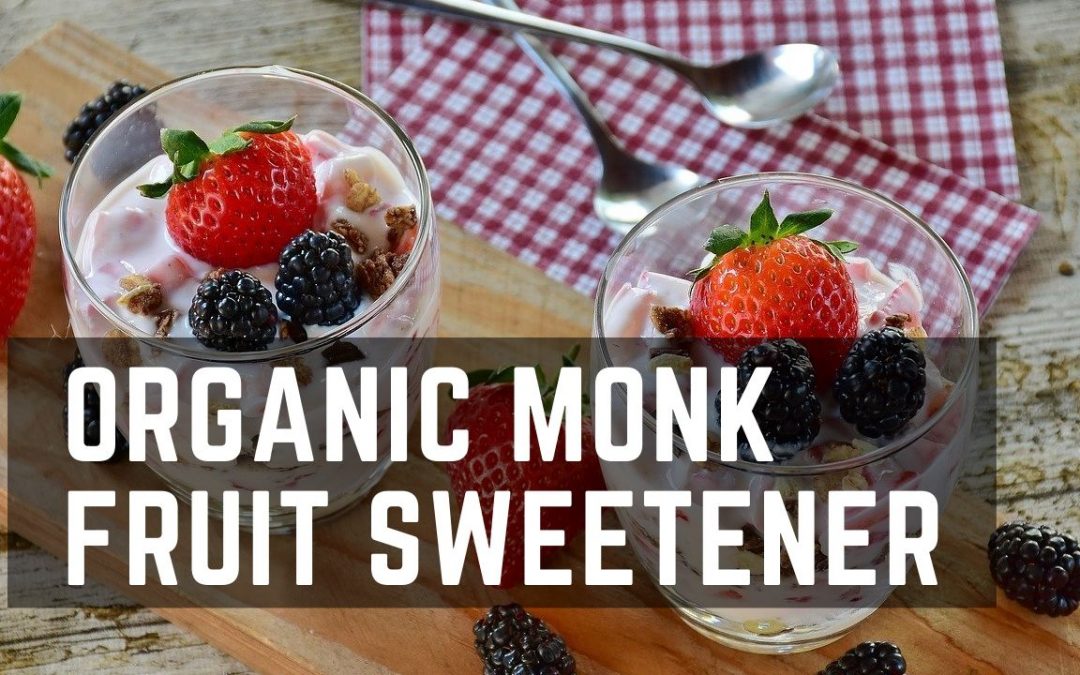Last Updated on December 4, 2020 by TheMealPrepNinja
What is Organic Monk Fruit Sweetener?
The organic monk fruit sweetener also referred to as monk fruit extract from the dried monk fruit is much sweeter than sugar with its sweetness being between 150-200 times sweeter than sugar. This figure is according to the International Food Information Council Foundation.
Many people love it and especially those who are pro-natural sweeteners. It is loved because it has zero calories and is not known to raise blood glucose or sugar levels. Approved by the FDA, the monk fruit sweetener is open for use by children and even expectant mothers since there are no scientific reasons for it being unsafe for consumption.
Different Organic Monk Fruit Options
Organic Liquid Monk Fruit Sweetener

Certified Organic Monk Fruit Extract Powder

Monk Fruit Extract 3.5oz (100g) 322 Servings, 100% Pure, Zero Calorie, Zero Carb

When you are shopping make sure you are buying 100% organic monk fruit sweetener and not a mix of monk fruit and another form of sweetener like erythritol. To get zero calories and zero carbohydrates it needs to be 100% monk fruit extract.
What Makes it Organic
The term organic refers to the process of how certain foods are grown. Organic foods have been grown without the use of artificial chemicals, artificial additives, and are not genetically modified organisms. Organically grown monk fruit sweeteners tend to use natural fertilizer like manure to improve natural growth.
Where does Monk Fruit come from?
The organic monk fruit sweetener extracted from the monk fruit also known as Lo Han Guo or Buddha fruit, or the Swingle fruit (Siraitia grosvenorii) is native to Southeast Asia covering part of China and Thailand. The monk fruit is small and green by appearance and resembles a small gourd that grows on a vine.
It got its name from the Buddhist monks who were cultivating it in the 13th century. Since then, it has consistently been in use by the Chinese in their Traditional China Medicine for decades.
The organic monk fruit sweeteners are created by eliminating the seeds and the skin of the fruit, crushing it and then collecting the juice.
The fresh monk fruit is known to spoil very quickly, which necessitated people to dry it, especially for herbal medicines. The monk fruit sweetener is safe according to the FDA (Food and Drug Administration) which approved its use in 2010. So far, there are no researches that look at the adverse effects of the monk fruit on the body.
Is Organic Monk Fruit Safe to Consume?

Yes indeed. The monk fruit sweeteners have been recognized as GRAS (Generally recognized As Safe) the FDA. This body does its research on a given product before they can be able to declare it as safe and fit for consumption. Many countries, including Japan, Canada, New Zealand, China, and Australia, have also adopted the monk fruit sweetener as safe for use.
An ADI (Acceptable Daily Intake) has not yet been agreed on or established because higher intake has shown no adverse effects. This product can be consumed by children, pregnant mothers, and diabetic patients safely.
What makes the monk fruit better than low calorie sweeteners?
The monk fruit sweetener is much better than other low calories sweeteners. This aspect is correct because of the presence of mogrosides which naturally occur in them. The mogrosides cause the fruit sweetener to have additional properties like anti-inflammatory attributes, which help in inhibiting the growth of cancer cells and also assists in the elimination of sore throats.
Other low calories sweeteners are known to cause issues such as gas, allergic reactions, and bloating, which is unlike the monk fruit sweeteners which are not known to have any clinically proven side effects.
They can be in baked goods due to their stability at high temperatures. This may cause a slight change in the final product though based on the texture, taste, and appearance. The general belief is that monk fruit sweeteners have antioxidant properties.
Pure Monk Fruit Extract – Nothing Else

Is Organic Monk Fruit Great for Weight Loss?
Currently, there is no scientific proof that the monk fruit is good for weight loss. However, the product does not contain any calories hence reduces calorie consumption. In one review, people who consume low-calorie sweeteners tend to consume less sugar, less fat, alcohol, and other contributors of calories to the body. The review further claimed that those who use low calories sweeteners might experience a weight loss of less than 0.9 kg, which is a milestone for those trying to lose weight.
Benefits of Organic Monk Fruit
The monk fruit is known to have several benefits that include the following:
1. Safe for diabetes -The natural compounds mogrosides are responsible for the sweetness in the monk fruit. For this reason, the monk fruit is generally safe even for diabetic patients since it does not increase the blood sugar in any way. It is essential to understand that other products that are monk fruit-based may contain additional sugars which may increase calories. It is advisable to check on them before purchasing. Mogrosides that are present in the sweetener can stimulate the secretion of insulin in the insulin cells.
2. It promotes weight loss – The monk fruit is free of calories, fats and carbs; hence it is perfect for all those individuals who are keen on watching their weights. It is important to remember to check the ingredients of the products you purchase.
3. It has Anti-inflammatory Properties – The mogrosides found in monk fruit is known to have anti-inflammatory properties which help prevent cancer and to keep the blood sugar stable. Traditional China Medicine has been using the monk fruit for centuries to prepare hot drinks which helps to reduce phlegm and relieve sore throats.
4. Antioxidant effects – the mogrosides contained in the monk fruit sweetener has antioxidant properties which inhibit harmful molecules and help to prevent any damage that may occur in your DNA.
5. Zero carbohydrates – The monk fruit sweetener does not contain any sugars, which makes it very suitable for people who are on keto diets.
6. Availability in multiple forms – The monk fruit sweeteners come in different types depending on your preferred use. You can buy them as powder, granules or liquids. The various forms allow for them to be carried and used efficiently.
Drawbacks of Monk Fruit Sweeteners
1. The monk fruit itself has infrequent allergies though there may be an allergic reaction when consuming one of its products. It comes from the Curcurbitaceae family, which is commonly known as the gourd family. This family includes pumpkin, melons, cucumbers and squash. For those people who are allergic to other gourds, there is a higher risk of allergic reactions, including hives or rash, dizziness, swollen tongue, difficulty in breathing and rapid or weak pulse.
2. The monk fruit sweeteners are much more costly because of the cost of importing and processing them. The monk fruit is challenging in terms of growing, harvesting and drying. It is challenging to find the fresh monk fruit unless you decide to visit the regions where it is being produced.
3. Some individuals may be turned off by the smell of the monk fruit in the sweetener. The aftertaste of the monk fruit sweetener is relative depending on the individual.
Recipes to Use Organic Monk Fruit Extract
Here are a few recipes that you can use monk fruit sweeteners
The Bottom Line
The monk fruit sweetener remains to be one of the best natural sweeteners. The effect that the sweeteners have on obese and chronic diseases has not yet established since it is a product that is still new in the market. So far, the random trials carried out on the sweetener show no negative impact on the blood sugar or insulin levels. We believe that this article will help shed light on the information that you seek.
What to Know
When you decide to give monk fruit sweetener a try make sure you get 100% organic monk fruit sweetener and not one that has additional ingredients


Jim Lopez, the founder and editor of The Meal Prep Ninja, shares his journey from a passionate bodybuilder and fitness enthusiast to a certified nutrition coach. Certified by Precision Nutrition, Jim aims to empower others with knowledge on meal prep and nutrition, offering resources for busy individuals to enjoy low-calorie, tasty foods. His blog is a community for sharing healthy eating habits and meal prep recipes




Oh man, I tried monk fruit before and was not a fan. Maybe I should give it another shot.